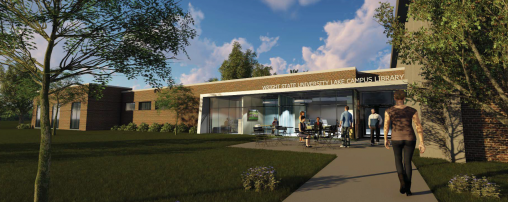
An artist’s rendering of what will be the new Lake Campus Extension Building.
The newest construction project at Wright State University–Lake Campus will provide needed space for the blossoming nursing program thanks in part to support from the Mercer County Health Care Foundation.
The Mercer County Health Care Foundation has donated $300,000 to support the Lake Campus’ Extension Building Project.
The building project will add approximately 7,000 square feet to Andrews Hall for a new Library and Technology Center, science education classroom and research lab, and space for the Lake Campus Bachelor of Science in Nursing Program.
Lake Campus broke ground on the $2.8 million project in the fall of 2018. Construction is expected to be completed by the start of the fall 2019 semester.
Mercer County Health Care Foundation is the lead donor on the project. Since it was founded in 1979, the foundation has donated more than $1 million to advance medical care and projects in the Mercer County area.
John Irmscher, chair of the foundation, said Lake Campus and its nursing program are a “real plus for the community.” He said both the nursing program and the Wright Rural Medical Scholars Program, which encourages Wright State medical students to pursue careers in rural Ohio, provide vital medical services to the Mercer County community.
“We are very fortunate to have received donations from local individuals, businesses and organizations to make this project a reality,” said Jay Albayyari, Lake Campus dean and chief administrative officer. “State Auditor Keith Faber also made a significant impact on this project by helping Wright State University–Lake Campus secure state funding.”
Lake Campus received $2.5 million in capital funding from the State of Ohio. Support for the project was also provided by Celina Insurance Group, Citizens National Bank, First National Bank of New Bremen, Bonnie Mathies, Mercer Savings Bank, Minster Bank, The Peoples Bank Company, Second National Bank Greenville, St. Henry Bank and WCSM Radio.
About two-thirds of the expanded space in Andrews Hall will house the Nursing Simulation Learning Resource Center, tripling the space available to nursing students at Lake Campus.
The new space will provide more opportunities for students to get hands-on training. It will include a six-bed open lab space for students to practice skill development; two private rooms; and a simulation room equipped with a high-fidelity simulator. The high-fidelity simulator allows nursing students to participate in simulation scenarios to improve their critical thinking and assessment skills. It creates “real-life” situations in which students provide care to the simulator in a safe environment. Students can administer medications, assess heart and lung sounds, insert catheters and provide CPR to the manikin while under the supervision of faculty members.
The Lake Campus nursing program is popular due to the demand for jobs in the community, said Gretchen Rentz, coordinator for development and community relations at Lake Campus.
“Students can go to school here and stay in the community. They can find jobs here,” she said.
Approximately 75 students are enrolled in the nursing program, with another 50 students taking the prerequisite courses needed for admission into the program. The first cohort of 14 nursing students graduated from Lake Campus during spring commencement.
“This group helped to make vision into reality as far as helping the community understand what was happening here,” Rentz said.
The Extension Building Project also includes a dedicated space for the Library and Technology Center, which has been housed in a trailer in recent years. The new library space will feature an open concept area, study bays and huddle rooms.
The new science education classroom and science research laboratory space will allow Lake Campus faculty to continue to increase their research efforts.
Lake Campus offers more programs that meet the needs of students and the community, Rentz said. In addition to the nursing degree, Lake Campus offers bachelor’s degrees in general business, engineering, education, integrated science, organizational leadership and psychology and an MBA degree.
In 2018, Lake Campus opened its Agriculture and Water Quality Education Center, which provides classroom space for the growing agriculture program; a research and laboratory area; and outreach facility for community meetings on agriculture production, water quality and other issues.

 Wright State recognizes Nursing Professor Kim Ringo for advancing international student success
Wright State recognizes Nursing Professor Kim Ringo for advancing international student success  Wright State honors graduating students for distinguished doctoral dissertations
Wright State honors graduating students for distinguished doctoral dissertations  Top 10 Newsroom videos of 2025
Top 10 Newsroom videos of 2025  Museum-quality replica of historic Hawthorn Hill donated to Wright State
Museum-quality replica of historic Hawthorn Hill donated to Wright State  Wright State celebrates more than 1,000 graduates at fall 2025 commencement
Wright State celebrates more than 1,000 graduates at fall 2025 commencement 